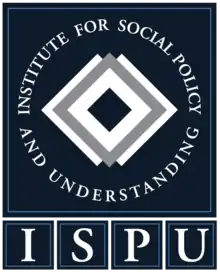Institute for Social Policy and Understanding
The Institute for Social Policy and Understanding (ISPU) was founded in 2002 as a research institution seeking to develop objective, solution-oriented research about challenges and opportunities facing American Muslims. As written in the Columbia Journalism Review, “Similar to Pew or Gallup, the Institute uses survey data to gauge the attitudes of Muslim Americans, and the general American public, on a wide range of topics in its annual American Muslim Poll (AMP). Those topics include political leanings, attitudes on censorship, experiences of discrimination, and responses to religiously motivated violence.”[1]
 | |
| Abbreviation | ISPU |
|---|---|
| Established | 2002 |
| Type | Think Tank |
| Location | |
| Website | Official website |
The Pulitzer Center on Crisis Reporting says, “The American Muslim Poll addresses a gaping deficit in popular knowledge: About 50 percent of Americans say they don’t know a Muslim in real life, leaving half the country to rely on the media to understand approximately 3.5 million of their compatriots, and 1.8 billion people around the world.”[2]
Funding
The Institute for Social Policy and Understanding is funded by individual donors and institutional grants, including the Democracy Fund, New York Community Trust, W.K. Kellogg Foundation, Pillars Fund, Proteus Fund, and others.[3][4][5][6][7]
Research areas and projects
ISPU’s research topics can be categorized in three parts: social policy, public policy, and thought leadership. Along with publishing original research, ISPU provides toolkits, interviews, webinars, presentations and workshops to disseminate this research to government officials, media professionals, educators, faith leaders and the general public.
Subject matter covered by ISPU studies and projects include: Studying marriage and divorce among American Muslims, tracking challenges facing American Muslim youth, analyzing Muslim spaces (mosques, community centers, etc.), and fostering debate and discussion on CVE (Countering Violent Extremism). ISPU has also conducted studies on Islamophobia and bias in media coverage of ideologically-motivated violence in the United States.
Key leadership
Meira Neggaz, Executive Director
Dalia Mogahed, Director of Research
Scholars and fellows
ISPU works with a number of experts on a wide variety of issues related to their respective areas of research and specialty. Affiliated scholars and fellows include: Laila Alawa, Moustafa Bayoumi, Hassan Abbas, Arsalan Iftikhar, Asifa Quraishi-Landes, Ihsan Bagby, and Hatem Bazian, among others.
Recognition
Work from the Institute for Social Policy and Understanding has been cited in the Columbia Journalism Review, which wrote in an article published in 2019 that ISPU data, “was cited more than 450 times in 2017”. ISPU research has also been referenced and cited in published articles from BuzzFeed News, The Intercept, NBC, the Chicago Sun Times, Huffington Post, Religion News Service, National Geographic, The Atlantic, The Washington Post, CBS, NBC, NPR, The New York Times, among others. ISPU’s recommendations for journalists have been cited by the Asian American Journalists Association, the Pulitzer Center for Crisis Reporting, and Harvard University's Journalist Resource.[8][9][10][11][12][13][14][15][16][17][18][19][20][21]
References
- Ahmed, Amal. "A better quality of data on Muslim Americans". Columbia Journalism Review. Retrieved 7 September 2019.
- Berk, Hannah. "Beyond Religion: Covering American Muslim Communities Confidently and Creatively". Pulitzer Center. Retrieved 7 September 2019.
- "Institute for Social Policy and Understanding". Democracy Fund. Retrieved 7 September 2019.
- "Oral Histories and Data Tell the Stories of Muslims in New York". New York Community Trust. Retrieved 7 September 2019.
- "Community BriefStrength Through Diversity: Four Cases of Local and State Level Coalition Success" (PDF). ISPU. Retrieved 7 September 2019.
- "Our Portfolio". Pillars Fund. Retrieved 7 September 2019.
- Downing, Claire. "10 Lessons Learned From 10 Years of RTF Grantmaking Lesson 5: Islamophobia is an Intersectional Phenomenon, and We Must Tackle It with Our Partners Across All Racial Justice Movements". Proteus Fund. Retrieved 7 September 2019.
- Ansari, Talal (22 March 2017). "Many Montana Lawmakers Seem To Be Falling For A Conspiracy Theory About Muslims". BuzzFeed. Retrieved 7 September 2019.
- Hussain, Murtaza (5 April 2018). "Muslims Accused of Plotting Violence Get Seven Times More Media Attention and Four Times Longer Sentences". The Intercept. Retrieved 7 September 2019.
- Blancaflor, Saleah (20 August 2018). "Islamic schools seek understanding amid rising hate crimes". NBC News. Retrieved 7 September 2019.
- Har, Janie (21 September 2018). "San Francisco museum shows off modern Muslim women's fashion". Chicago Sun Times. Associated Press. Retrieved 7 September 2019.
- Kuruvilla, Carol (2 May 2019). "American Jews And Muslims Are 'Natural Allies' With Close Bonds, Study Finds". Huffington Post. Retrieved 7 September 2019.
- Khan, Aysha (1 May 2019). "Anti-Muslim hate is driven by politics, not faith — and it's preventable, study suggests". Religion News Service. Retrieved 7 September 2019.
- Fadel, Leila. "How Muslims, Often Misunderstood, Are Thriving in America" (May 2018). National Geographic. Retrieved 7 September 2019.
- Lantigua-Williams, Juleyka (15 March 2016). "Does Islamic Faith Strengthen American Patriotism?". The Atlantic. Retrieved 7 September 2019.
- Calfano, Brian; Lajevardi, Nazita (23 August). "Most U.S. Muslims are patriots. Asking them to choose between faith and nation has a pernicious consequence". The Washington Post. Retrieved 7 September 2019. Check date values in:
|date=(help) - "Study: Muslim voters don't support Trump but are more optimistic about the future". CBS News. 8 May 2019. Retrieved 7 September 2019.
- Fadel, Leila (16 April 2018). "Bullied For Its Faith, Muslim Family Fights Back Through Education". NPR. Retrieved 7 September 2019.
- Beydoun, Khaled (13 June 2018). "To Be Poor and Ignored During Ramadan". The New York Times. Retrieved 7 September 2019.
- Lari, Waliya. "Seven ways to avoid double standard reporting on extremist violence (Report)". Asian American Journalist Association. Retrieved 7 September 2019.
- Jain, Kalpana (7 February 2019). "6 reporting tips for covering Islam in America". Journalist's Resource. Harvard Kennedy School's Shorenstein Center and the Carnegie-Knight Initiative. Retrieved 7 September 2019.